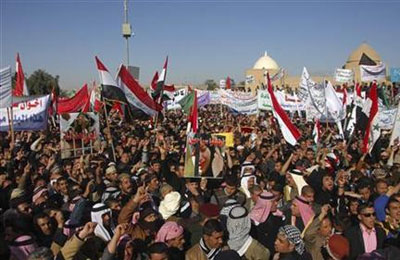
Saddam deputy supports Iraq Sunni protests
Baghdad, January 6, 2013
The most senior member of former Iraqi dictator Saddam Hussein's entourage still at large has urged Sunni Muslim anti-government protesters to stand their ground until Shi'ite Prime Minister Nuri al-Maliki is toppled.
Izzat Ibrahim al-Douri heads Saddam's Baath party, which was banned after the US-led invasion in 2003 that overthrew the Sunni strongman and empowered majority Shi'ite Muslims.
Over the past two weeks, tens of thousands of Sunnis, some waving Saddam-era flags, have staged demonstrations in a show of anger against Maliki, whom they accuse of marginalising their community and monopolising power.
"The people of Iraq and all its nationalist and Islamic forces support you until the realisation of your just demands for the fall of the Safavid-Persian alliance," said Douri, addressing the protesters in footage broadcast on Alarabiya television.
Safavid is a reference to the ruling dynasty of Shi'ite Iran from the 16th to 18th centuries that at times also controlled parts of modern-day Iraq.
Since Maliki came to office in 2006, Iraq has edged closer to neighbouring Iran, which wields strong influence over several Iraqi Shi'ite parties.
Surrounded by men in military uniform, Douri said the Baath party leadership was considering launching a campaign to "justly and decisively" punish civilians and soldiers who supported what he described as Iran's "Safavid project" for Iraq.
"It is a clear plan to destroy Iraq and annex it to Iran," he said. "We warn those traitors, agents and spies ... who support the dangerous project ... that the national resistance will confront them before Maliki and his evil alliance".
The authenticity of the video could not be verified. Douri said he was speaking from the Iraqi province of Babil.
CAPTURE (OR KILL)
Influential Shi'ite cleric Moqtada al-Sadr, a rival to Maliki who has voiced support for the Sunni rallies, said Douri and his followers were agents of the United States and Israel and urged protesters to denounce him.
"If the government is not able to seriously and urgently capture (or kill) him, this will be our job, we the soldiers of God upon earth," he said in a statement on his website.
Douri, seldom seen since 2003, was the deputy head of Iraq's Revolutionary Command Council under Saddam, and took over the Baath Party leadership after Saddam was executed in 2006.
After the 2003 invasion, he was ranked sixth on the US military's list of 55 most wanted Iraqis and a $10 million reward was offered for his capture. US officials accused him of organising the insurgency that peaked in 2005-07.
The conflict in neighbouring Syria, where a Sunni-led insurgency is fighting to remove a leader backed by Shi'ite Iran, is whipping up sectarian tension across the region and straining a precarious political balance between Iraq's Sunni, Shi'ite and Kurdish factions.
That has raised concern about a relapse into intercommunal slaughter in Iraq just over a year since US troops withdrew.
A car bomb parked near a vegetable and fruit market in the town of Kanaan in Diyala province killed two people on Saturday, police said, in an attack the mayor blamed on Baathists seeking to ignite sectarian strife by targeting mixed areas.
The protests in Iraq's Sunni Muslim heartland pose a new challenge to Maliki, who is already at odds with the autonomous Kurdish region in the north.
Iyad Allawi, the head of the Sunni-backed Iraqiya political bloc, on Friday called on Maliki to resign and for an interim government to be formed until early elections.
Failing that, Maliki's alliance should select an alternative prime minister and form a government that would respect the constitution, Allawi said in a statement.
"The continuation of this government will not produce anything except more crises and waste of public money."
The latest crisis gathered pace just hours after President Jalal Talabani, seen as a steadying influence On Iraq, suffered a stroke and was flown abroad for medical care.
Talabani's medical team said on Saturday the 79-year-old Kurd was responding very well to treatment and had "passed the difficult stages more quickly than expected", but gave no details about his health or whether he is able to communicate. – Reuters







